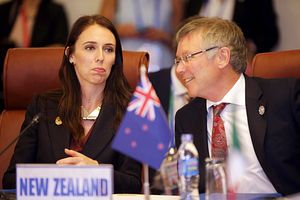Little over a month has passed since New Zealand’s sixth Labor government was sworn in, with Jacinda Ardern’s elevation to the premiership ending weeks of electoral uncertainty following the inconclusive results of the nation’s September 23 election.
The center-left Labor Party, which holds 46 seats in the country’s 120-seat Parliament, entered into a coalition with New Zealand First, a populist party combining traditional interventionist economics with elements of social conservatism, that holds nine seats. The Green Party, which holds eight seats, entered into a confidence and supply agreement with Labor.
Following an election campaign in which Labor attacked the National-led government over its record on housing affordability and rising immigration, the new government is working to implement key campaign promises made regarding those issues. A promised ban on non-residents or non-citizens purchasing residential property is set to come into effect by early 2018. Labor’s target of cutting net migration by 30,000 a year – a plan outlined under Ardern’s predecessor as Labor leader, Andrew Little – also appears to now be government policy, though it is a significantly higher target than New Zealand First’s policy of cutting net migration from roughly 73,000 down to 10,000.
However, there is one key area where Labor’s stance in opposition has not carried over to its actions in government: trade. Opposition to the Trans-Pacific Partnership (TPP) trade deal was a significant dividing issue during the 2014-17 parliamentary term, with Labor opposing the agreement, primarily over concerns that the investor-state dispute settlement (ISDS) provisions eroded national sovereignty. David Parker, a Labor MP who is now New Zealand’s trade minister, addressed a large anti-TPP protest on the steps of Parliament in August 2015. All three parties now in government voted against ratification in November 2016.
Now in government, Prime Minister Ardern has thrown herself headfirst into multilateral efforts to revive the agreement following the United States’ withdrawal after Donald Trump’s inauguration as president. This November, Ardern took part in negotiations on the Comprehensive and Progressive Agreement for Trans-Pacific Partnership (as the deal is now known, at the request of Canada’s Justin Trudeau) at the 2017 APEC summit in Da Nang, Vietnam, billed as the prime minister’s first overseas challenge. Speaking to reporters after the first round of negotiations, which left four remaining points of contention to be resolved, Ardern identified a narrowing of the ISDS provisions as evidence of “New Zealand’s advocacy at work.”
This is not to say that Ardern’s partners in government, or her traditional supporters, are necessarily convinced. The Green Party, which is bound to support the government only on budgets and votes of confidence, announced it would not support the CPTPP, citing a lack of significant divergence from the previous TPP agreement. It is also unclear whether New Zealand First, whose leader once stated the TPP would open a “diplomatic-economic Pandora’s Box,” will support the revised agreement. The party’s coalition agreement with Labor makes no reference to the agreement; its only reference to trade policy is a commitment to working toward a free trade agreement with the Russia-Belarus-Kazakhstan Customs Union, on which no progress has been made as of yet. Traditional critics of the TPP such as Auckland University law professor Jane Kelsey are also unpersuaded, arguing that the deal’s “toxic elements” are suspended for now, only to be re-activated if the United States decides to re-join the deal.
However, this opposition appears unlikely to prevent New Zealand’s ratification if negotiations are successful. The center-right National Party, which holds 56 seats in the House, has announced its support for the deal, giving a clear parliamentary majority for ratification. What is less clear, however, is how Labor relying exclusively on opposition support to ratify the new deal will be perceived politically. It is perhaps unsurprising that Labor, the party that previously signed an FTA with China and participated in the TPP’s predecessor, has resumed its traditional support for closer trade ties with Asia on its return to government.
Taran Molloy is a political commentator based in Wellington, New Zealand. He is currently studying Law and International Relations at Victoria University of Wellington.

































